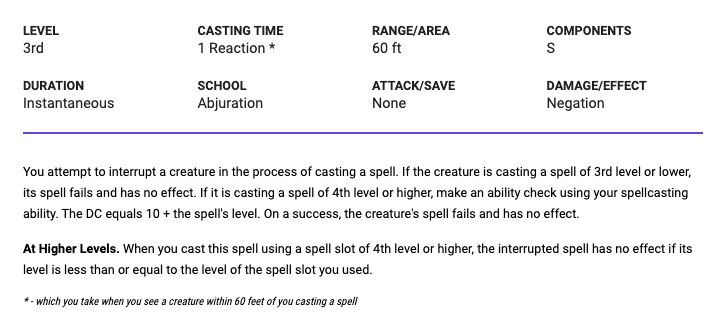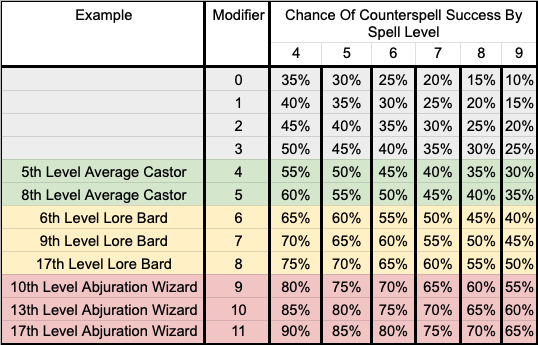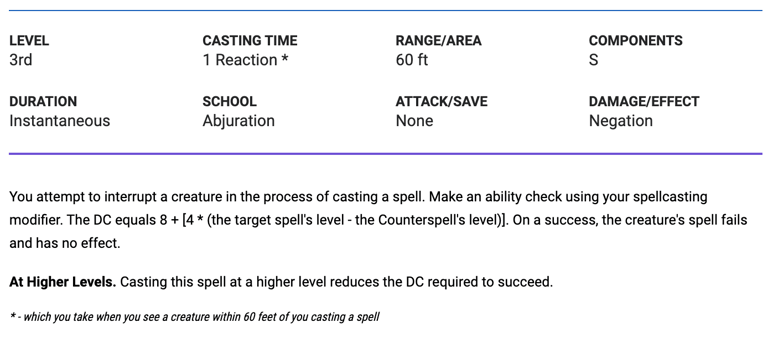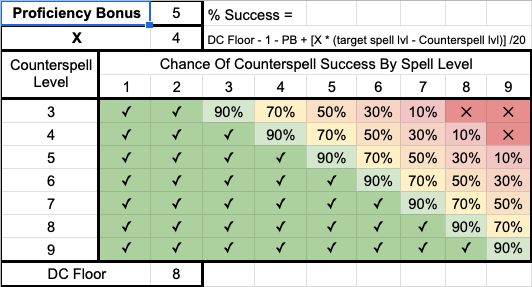Fixing Counterspell

In all of D&D there are few spells as controversial as Counterspell. Counterspell is a 3rd level Spell that allows one spellcaster to cancel a spell cast by another. Some love the spell, some hate it.
No matter what side of the argument you fall on, we can all agree, It feels bad to be Counterspelled if you never knew that such a spell existed. In this article, I work to prepare both players and DMs with the information and tools they need to embrace Counterspell. You will be able to include it into your game in a way that contributes to dramatic tension and furthers the plot.
Those who enjoy the spell note how satisfying it is as a player to undo the plans of a rival caster. They place themselves in just the right location to to save a comrade from being banished to another dimension or vaporized by a lightning bolt. DMs speak about how the spell allows them to challenge their players. It forces their players to engage spellcasters in combat early such that their support casters can cast their valuable healing magic without fear of having their actions canceled.
Some criticize the spell and ban its usage from their game. Chief complaints are that the spell is anti-climactic. Instead of both the Player Character and the villain conjuring dramatic and cinematic fireballs, tidal waves, and Meteor Storms, both spend a spell simply preventing the other from contributing to the narrative. It is comparatively cheap to Counterspell even a very high level spell which means that it is a no brainer to use it, taking the drama out of the decision making process.
These arguments are often presented in such a way to unilaterally support or malign Counterspell without qualification. With each, there is a myriad of suggested alternate Counterspell rules available on the internet. I have yet to see a source that fairly evaluates the spell and its practical usage at tables, nor a suggested replacement that is simple enough to implement easily.
In this article, we examine the common misconceptions about Counterspell. We give some suggestions to spice up the use of the spell. We examine the problems that still exist even when using the spell correctly, and offer a minor change that any DM can add to their game no matter your particular feelings on the spell.
Common Mistakes And Rule Clarifications
First, let us start with the controversial misconceptions of how Counterspell works as written.
 Identifying The Spell Before Deciding to Counter
Identifying The Spell Before Deciding to Counter
Most people do not play Counterspell with "Rules As Written." When played by the book, Counterspell is significantly nerfed because it is difficult to know what spell is being cast in the first place. In the Xanathar's Guide to Everything source book, the game designers decided to make the rules surrounding Counterspell even more convoluted. They specify:
If the character perceived the casting, the spell’s effect, or both, the character can make an Intelligence (Arcana) check with the reaction or action.
Most tables do not use this rule because it introduces two big problems that did not exist before its release.
Gameplay Grinds To A Halt
Every time anyone ever tries to cast a spell, they should technically open with "I am going to cast a spell, are there any objections?" If they do not do so, they risk giving the other side more information with which to decide they want to attempt to Counterspell.
It also costs a reaction to cast Counterspell. This means that every time an enemy announces that they are going to Counterspell, players need to pause gameplay try to persuade each other to use their reaction to attempt to identify the spell being cast so that other players have more information when deciding whether they want to then use Counterspell.
Deferring The Spell Reveal Heavily Incentivizes Cheating
Because players and DMs keep the spell they are going to cast a secret until after the Counterspell phase resolves, they can simply change the spell they were going to cast after they know the result. There are a number of ways that both parties can rationalize this behavior as well. Perhaps you are the player and you know the story will benefit from the epic spell you are about to cast. Perhaps you are the DM, and you know that it will be more dramatic if your villain's teleport spell succeeds and they escape to fight another day. We all like to think the best of the people we play with, but there are few scenarios in D&D which offer such a tantalizing opportunity to be dishonest with such a low chance of getting caught with such significant benefits.
For these reasons most folks announce the spells they are casting and at what level. Anyone who wants to Counterspell gets to interrupt their super cool spell description to announce their attempt at denying them that ability. When considering the alternative outlined above, it is clear that this is more natural. It cannot be denied though, Counterspell is a much more powerful spell when used with more complete information.
Calculating The Modifier Correctly
Spellcasting ability check is just your ability modifier. Proficiency bonuses are typically NOT included in this check. This alone is enough to satisfy many critics of the spell that claim it is too powerful as including proficiency bonus would give most casters well over a 50% chance to cancel even a 9th level spell with a (DC of 19) with a reaction and a 3rd level spell slot (by the higher levels this is basically free).
Exception 1: Bards are able to learn Counterspell via their magical secrets ability and gain a bonus to ALL ability checks (including spellcasting ability checks). The bonus from Jack of all trades is equal to half their proficiency bonus rounded down.
Exception 2: 10th level Abjuration Wizards add their proficiency to attempts to Counterspell thanks to the Improved Abjuration ability.
We can see that most players have about the chance of being able to successfully Counterspell much closer to 50% when we calculate the spellcasting ability check percentage correctly.
Furthermore, we see that highly optimized anti-castors can Counterspell with much higher confidence, but this is a prominent feature of their class so it can be argued that this makes thematic sense.
If you didn't like the spell, because you were always including your player's proficiency bonus, maybe this will correct the balance in your game.
Casting Through Magic Items
Many argue that because Counterspell targets a creature, it can be avoided via the use of magic items that cast spells. However, One of D&D's chief rules designers has clarified that items that specify that they cast spells can indeed be Counterspelled. This implies that in order to use an item from a magic item, you need to perform some type of movement or incantation that makes it clear that you are going to do so. This activity exposes you to Counterspell.every
Question: "is it possible to counterspell a magic item? Such as staff of the magi or staff of fire?"
Answer: "Only if the magic item specifically says it allows you to cast a spell."
This was always a thin defense against Counterspell anyway as the powerful items of your villains quickly become the powerful items of your players.
Preparation Is Everything
Now that we know exactly how Counterspell works, allow me to issue a warning. If you are not prepared, Counterspell can completely annihilate a high-level spellcasting PC or Villain. I have been a part of an 8th level party that completely dunked on a CR 15 spellcaster because two members of the party had Counterspell and used it liberally.
As a player, you can easily lose a beloved Player Character if your Dimension Door or Misty Step escape plan is abruptly canceled. On the flip side, when both DMs and players know the terms of the Counterspell game, it can make for some of the most fun a spellcaster can have. Here are some of the most common ways that players and DMs can play around Counterspell.
Keep Your Distance
Counterspell has a fairly limited, 60ft range compared with many other spells. Simply back your caster up out of range before casting that big spell.
Particularly clever players might take the Spell Sniper feat or make use of Distant Spell Meta Magic to double that range to 120ft.
Melee spellcasters with access to Counterspell are particularly dangerous as they will usually attempt to close as much distance with your caster as possible.
Out Of Sight Out Of Range
The spell specifies that one must see the creature casting in order for the spell to work correctly. Duck behind cover quickly, or make use of the Greater Invisibility spell in order to give yourself Counterspell immunity
Be wary, clever players will Counterspell your attempts to cast Greater Invisibility at all costs*.*
Some class abilities allow casters to sling magic without verbal or semantic components. You can't counter what you can't see.
Counter That Counter Counterspell
Just like any spell, Counterspell can be countered. You are able to use your reaction during your turn to block an enemy's attempt to cancel your own spell.
If an enemy is trying to cast a big spell that you want to be sure won't succeed, multiple party members can Counterspell the same spell. You have to decide to do so before you know if the first attempt succeeds. Still, better safe than sorry.
Bring an entourage. Every properly important caster has an entourage of apprentice casters that can bring their own Counterspells to bear. This will give your physical combatants an interesting tactical objective as well.
Make Your Descriptions Awesome
One of the biggest arguments against Counterspell is that it sucks all the action and drama out of your game. Prove them wrong, every Counterspell should be an intense clashing of wills and arcana.
Morgana holds out her hand pointing a finger in your direction, she cackles to the sky, "You Lose Arther Pendragon!" A sickly green light launches from her toward the injured knight, you see it in slow motion, death itself hurtles towards you... Then an explosion of arcane force as the blue flash from Merlin's Counterspell intercepts Morgana's necromancy midair. "NO! You have meddled for the last time!", her world consuming spite focused on you, Merlin.
Recommended Changes
Still not satisfied with Counterspell as written? Well, neither are we. We still think that Counterspell is too powerful. High-level casters often have too many spell slots to cast to be worried about saving 3rd and 4th level slots. They are looking for opportunities to cast spells with both their action and reaction and Counterspell presents a no-brainer opportunity for little to no cost or risk. If you are trying to mitigate the potency of Counterspell by using Xanthar's rules for identifying spells, well that is an even bigger mistake for pacing and social reasons.
Furthermore, the benefits of upcasting Counterspell are poorly designed. Upcasting Counterspell has no benefits until the spell suddenly auto succeeds. This is particularly bad design for Warlocks who always cast their limited spells at the highest possible level. Our changes give you a more reliable benefit for upcasting.
And so we propose the new description in the style of the old:
The formula above can be broken down as follows:
DC = <DF Floor> + [<NC> * (<target spell level - Counterspell level>)]
In our usage of the formula we set DC Floor to 8 and NC (Nerf Coefficient) to 4. These values result in the following probabilities when the player has about an average bonus of +5 to their attempts to counterspell.
You can experiment with the inputs to the formula by duplicating this google sheet. and changing these values yourself.
- Increasing and decreasing the DC Floor will shift the band right and left.
- Decreasing the NC or Nerf Coefficient will keep Counterspell effective against higher level spells.
Additionally, we throw out the spell identification rules from Xanathar's Guide to Everything for the reasons described above. When a spell is cast, the caster announces the spell and the level that the spell is cast, if no level is specified it is assumed to be the lowest possible level of the spell. Most people are already doing this. This requires that players RP how they are able to determine whether or not they recognize the spell that has been announced. This is far less problematic than the potential to cheat via the Xanathar's rules.
For those of you who want all the info of this article jam-packed into a single Counterspell description, here you go. It is lengthy, but most of the additional length comes from gathered clarifications on the official spell description (which relies on the internet to answer its ambiguity).![You attempt to interrupt a creature that you can see in the process of casting a spell. Invisible creatures or spells cast without verbal or somatic components cannot be targeted. You are able to determine the level of the spell and the nature of the spell before you decide to cast Counterspell. Creatures that use innate spellcasting abilities or items that replicate spell effects (like the Necklace of Fireballs) cannot be targeted with Counterspell. Creatures that use items to cast a spell (like the Staff of Power) can be targeted with Counterspell. Make an ability check using your spellcasting modifier. The spellcasting modifier does not typically include a proficiency bonus, but skills such as Jack of All Trades and Improved Abjuration that specify otherwise do provide an additional bonus. The DC equals <DC Floor> + [<Nerf Coefficient> * (the target spell's level - the Counterspell's level)]. The DC Floor can be increased to raise the difficulty of Counterspelling all spells gradually. The Nerf Coefficient can be increased to increase the benefit of casting Counterspell at a higher level We recommend DC Floor = 8 and a Nerf Coefficient = 4 to offset to the increase of effectiveness to Counterspell granted by knowing the spell that is being targetted. On a success, the creature's spell fails and has no effect. The spell slot is lost. At Higher Levels. Casting this spell at a higher level reduces the DC required to succeed. * - which you take when you see a creature within 60 feet of you casting a spell](https://www.runningofftherails.com/hs-fs/hubfs/Screen%20Shot%202021-01-20%20at%201.13.28%20PM.png?width=664&name=Screen%20Shot%202021-01-20%20at%201.13.28%20PM.png)
In Summary, throw out the Xanathar's rules to increase the pacing of your games. Be prepared to play around Counterspell as a player and definitely as a DM. Try out our Counterspell modification and tell us whether it works for you. Let us know what interesting combinations of inputs you use and why you like them. If you like this content check out our podcast, Running Off The Rails.



